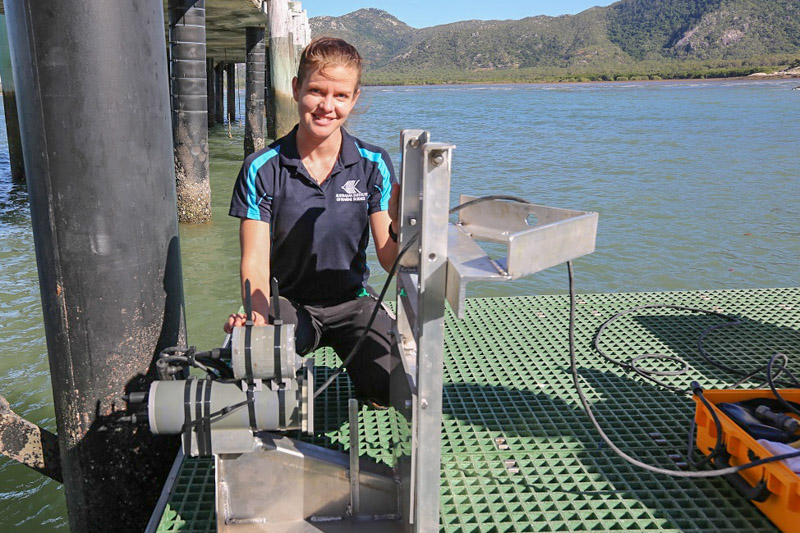Melanie Olsen is harnessing 10 years of missile defence and electronic warfare systems expertise to drive rapid technological innovation in marine research and monitoring. Today, on International Women in Engineering Day, the AIMS Team Leader for Technology Development Engineering shares her unique journey.
Growing up in a third-generation farming family near the small settlement of El Arish in north Queensland, Melanie Olsen thought engineers were train drivers.
When a James Cook University engineering lecturer visited her small rural high school with a quad helicopter, Mel knew she’d found her career path and studied computer systems engineering at James Cook University.
She was accepted into the Defence Material Organisation (now Capability Acquisition and Sustainment Group) graduate program that gave her the opportunity to conduct three six-month rotations across Defence, helping to build and sustain Defence capabilities.
When she got to maritime electronic warfare systems and missiles, she found her niche.
For 10 years, Mel worked closely with project teams in Canberra, Adelaide and the USA in the design, acquisition and sustainment of future maritime electronic warfare technology, such as the Nulka hovering rocket active missile decoy system. After hours, Mel also studied part-time and obtained a Masters in Electronic Warfare Systems Engineering from UNSW.
Mel discovered she had a talent for translating science-speak to the engineers and stakeholders and engineering-speak to the scientists and project managers.
“I hardly ever noticed I was the only female in the room until people pointed it out,” she said.
Once, when meeting her US collaborators face-to-face for the first time, they were surprised to discover she wasn’t a bloke called Mel (short for Melvin they had thought).
It wasn’t unusual for stakeholders meeting her to assume she was the executive assistant rather than the managing engineer.
From electronic warfare to leading innovation to help protect the Reef
Throughout her career in a male-dominated industry, Melanie pushed through those awkward moments of being singled out, focusing on delivering solutions to the challenge at hand.
While she loved her job, the long hours, overnight international teleconferences and short-notice travel was difficult to manage as a single mother with no family support nearby.
Mel saw the opportunity to apply for a job closer to home with the Australian Institute of Marine Science (AIMS) position of engineering team lead, technology development. She started in 2016 and discovered there were many similarities to her role in Defence.
These days she leads an innovative team developing systems helping to protect coral reefs rather than national sovereignty. They are driving rapid technological innovation to open new capabilities for Australia’s tropical marine research agency.
The aim is to design technological solutions to enable AIMS to meet its 2025 Strategy target to deliver twice the information in half the time and at half the unit cost.
This includes introducing autonomous vehicles and artificial intelligence (AI) to make data collection and analysis more robust, efficient and safe.
These solutions are being sustainably integrated into AIMS’ tropical marine observation network.
Mel is also Project Director of ReefWorks, AIMS’ newly established tropical marine technology test range, the first such facility in Australia.
ReefWorks offers a national capability to test marine technologies, remotely-piloted and autonomous systems, and new sensors in a secure, tropical marine environment.
It opens opportunities for the marine autonomous systems industry and Government organisations such as Defence to harness AIMS’ capability, tropical marine expertise and nimbleness in conducting test and evaluation, as well as enabling AIMS scientists and engineers to learn from colleagues in related industries.
'Civilisation was built on people giving it a crack'
Mel has been the IEEE (Institute of Electrical and Electronic Engineers) Northern Australia Section Chair since 2020, joined the Australian Army Reserves in 2019 and is a competitive powerlifter.
She’s a member of the AIMS Equity, Diversity and Gender (EDGE) Working Group which was awarded Athena Swan Bronze status in 2020 for its commitment to improving gender equity, diversity and inclusion.
Her advice to girls and women seeking a career in engineering is simple: “civilisation was built on people giving it a crack”.
“Don’t go in worrying you are not capable or good enough,” she said. “You’ll learn as you go, and soon you’ll realise that no one has all the answers.”



